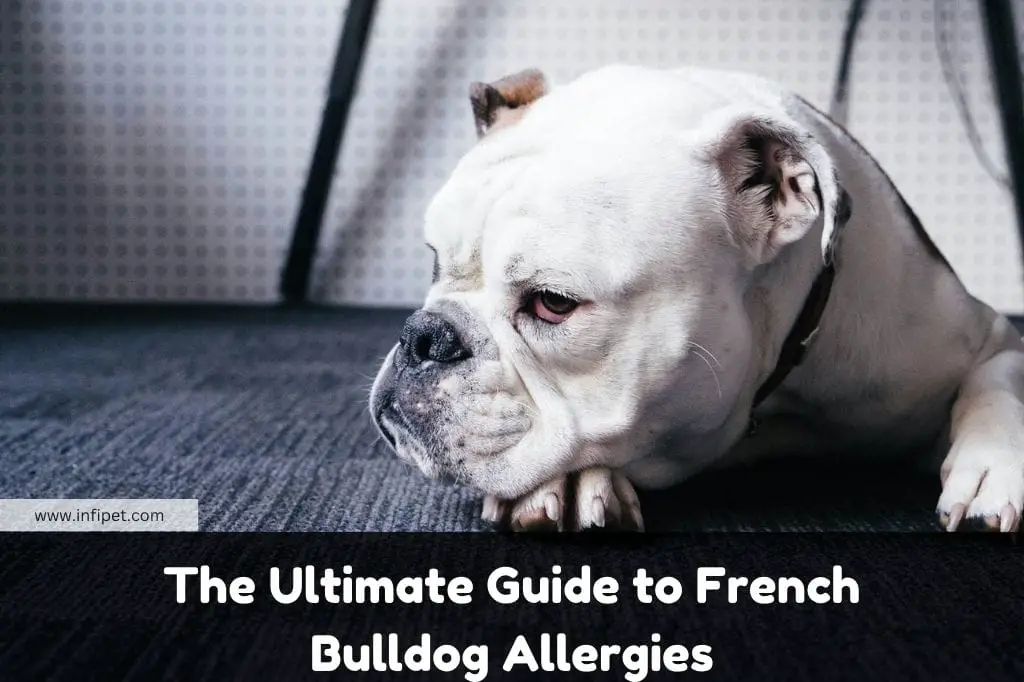Welcome to the ultimate guide on French Bulldog allergies! If you’re a proud Frenchie owner, you know how important it is to keep your furry companion happy and healthy. Unfortunately, just like humans, French Bulldogs can also suffer from allergies that can impact their overall well-being.
In this comprehensive guide, we will delve into everything you need to know about allergies in French Bulldogs and how to effectively manage and prevent them. From identifying common allergens to understanding the signs and symptoms of allergies, we’ll provide you with the knowledge to become your Frenchie’s allergy advocate.
With the right care and strategies in place, you can ensure that your beloved Frenchie stays in optimal health and lives a comfortable, allergy-free life. We’ll explore dietary considerations, grooming tips, and environmental changes that can significantly reduce your Frenchie’s exposure to allergens.
Whether you’re a seasoned Frenchie owner or a new puppy parent, this guide is your go-to resource for understanding and managing French Bulldog allergies. So let’s dive in and help your furry friend enjoy a happy and itch-free existence!
Common allergies in French Bulldogs
French Bulldogs can be prone to various allergies, and it’s important to be aware of the common culprits. One of the most prevalent allergies in Frenchies is food allergies. These can manifest as itching, gastrointestinal issues, or even chronic ear infections. Common food allergens for French Bulldogs include beef, chicken, dairy, wheat, and soy.
Another common allergy in French Bulldogs is environmental allergies. These can be triggered by pollen, dust mites, mold spores, or even certain fabrics. Environmental allergies often lead to symptoms such as itching, sneezing, watery eyes, and skin irritation. Frenchies with environmental allergies may also develop secondary infections due to excessive scratching and licking.
Lastly, French Bulldogs can also suffer from flea allergies. Even a single flea bite can cause an allergic reaction in sensitive individuals. Flea allergies typically result in intense itching and can lead to hair loss, hot spots, and skin infections. It’s crucial to maintain a flea prevention routine to protect your Frenchie from these pesky parasites.
Understanding the common allergies that affect French Bulldogs is the first step in managing and preventing them. By being vigilant and proactive, you can help your Frenchie live a comfortable and allergy-free life.
Also you may like to read: Why Do Other Dogs Not Like French Bulldogs? Here Is Why!
Symptoms of allergies in French Bulldogs
Identifying the signs and symptoms of allergies in French Bulldogs is essential for early detection and effective management. While each Frenchie may exhibit slightly different symptoms, there are some common signs to look out for.
One of the most noticeable symptoms of allergies in French Bulldogs is itching. If your Frenchie is constantly scratching, biting, or licking their paws, face, or body, it could be a sign of an allergic reaction. Excessive itching can lead to hair loss, open sores, and skin infections if left untreated.
Another common symptom is red and inflamed skin. Allergies can cause your Frenchie’s skin to become irritated and appear red or rash-like. You may also notice small bumps or hives on their skin. Additionally, allergies can affect their ears, leading to chronic ear infections characterized by redness, swelling, and a foul odor.
Respiratory symptoms such as sneezing, coughing, and watery eyes can also indicate allergies in French Bulldogs. If your Frenchie exhibits these symptoms, especially during specific seasons or when exposed to certain environments, it’s likely they have environmental allergies.
Keep a close eye on your Frenchie’s behavior and appearance for any of these symptoms. Early recognition and prompt action can make a significant difference in managing allergies and ensuring your Frenchie’s comfort.
Identifying the allergens
To effectively manage your Frenchie’s allergies, it’s crucial to identify the specific allergens triggering their reactions. The most reliable way to determine the allergens is through an elimination diet or allergy testing.
An elimination diet involves removing potential allergens from your Frenchie’s diet and reintroducing them one by one to identify any adverse reactions. This process can be time-consuming but provides valuable insights into your Frenchie’s food allergies. Working with a veterinarian or a veterinary nutritionist can help guide you through the elimination diet process.
Allergy testing, on the other hand, can provide a more comprehensive understanding of your Frenchie’s allergies. There are two main types of allergy tests: blood tests and intradermal skin tests. Blood tests measure your Frenchie’s antibody levels against specific allergens, while intradermal skin tests involve injecting small amounts of allergens under the skin to determine the reaction.
Once you have identified the allergens, you can take steps to minimize your Frenchie’s exposure to them, ultimately reducing their allergic reactions. This may involve dietary changes, environmental modifications, or avoiding certain fabrics or grooming products. Understanding the specific allergens affecting your Frenchie is vital for effective allergy management and improving their quality of life.
Tips for preventing allergies in French Bulldogs
Prevention is always better than cure, and when it comes to allergies in French Bulldogs, there are several proactive measures you can take to reduce the risk of allergic reactions.
Maintaining a healthy diet is key in preventing food allergies. Opt for high-quality, hypoallergenic dog food that is free from common allergens such as beef, chicken, dairy, wheat, and soy. Consider consulting with a veterinary nutritionist to ensure your Frenchie’s diet is well-balanced and tailored to their specific needs.
Regular grooming plays a crucial role in preventing allergies. Bathe your Frenchie using a gentle, hypoallergenic shampoo, and ensure their coat is thoroughly dried to prevent moisture-related skin issues. Brushing your Frenchie’s coat regularly not only helps in removing allergens but also promotes healthy skin and minimizes shedding.
Creating an allergy-friendly environment is another essential step. Keep your home clean and free from dust, mold, and pollen by regularly vacuuming, dusting, and using air purifiers. Wash your Frenchie’s bedding frequently using hypoallergenic detergent, and avoid using harsh cleaning products that may trigger allergic reactions. Additionally, consider using allergen-proof covers on your Frenchie’s bed and furniture to minimize exposure.
By implementing these preventive measures, you can significantly reduce the risk of allergies in your Frenchie and help them lead a happy and healthy life.
Home remedies for treating allergies in French Bulldogs
While it’s important to consult a veterinarian for proper diagnosis and treatment, there are some home remedies that can provide relief for your Frenchie’s allergy symptoms.
One common home remedy is soothing baths. Use a gentle, hypoallergenic shampoo and lukewarm water to bathe your Frenchie. Adding oatmeal or coconut oil to the bath can help soothe itchy skin. Be sure to rinse your Frenchie thoroughly to remove any residue that may further irritate their skin.
Another natural remedy is apple cider vinegar. Adding a small amount of apple cider vinegar to your Frenchie’s water bowl can help alleviate allergy symptoms. Apple cider vinegar has anti-inflammatory properties and can help improve your Frenchie’s overall skin health.
Additionally, omega-3 fatty acids can be beneficial for French Bulldogs with allergies. Omega-3 supplements, such as fish oil, can help reduce inflammation and improve your Frenchie’s skin and coat health. Consult with your veterinarian for the appropriate dosage and type of omega-3 supplements for your Frenchie.
It’s important to note that while these home remedies can provide temporary relief, they do not address the underlying cause of the allergies. If your Frenchie’s symptoms persist or worsen, it’s crucial to seek veterinary advice for proper diagnosis and treatment.
When to see a veterinarian
While home remedies can provide some relief, it’s essential to know when it’s time to seek professional help from a veterinarian. If your Frenchie’s allergy symptoms persist, worsen, or significantly impact their quality of life, it’s time to schedule a veterinary appointment.
A veterinarian will be able to perform a thorough examination, discuss your Frenchie’s medical history, and recommend appropriate diagnostic tests. They may also prescribe medications such as antihistamines or corticosteroids to manage your Frenchie’s allergy symptoms.
In some cases, your veterinarian may refer you to a veterinary dermatologist for further evaluation and specialized care. Veterinary dermatologists are experts in diagnosing and treating skin-related issues, including allergies. They may recommend more advanced allergy testing, immunotherapy, or other treatment options based on your Frenchie’s specific needs.
Remember, your veterinarian is your Frenchie’s best ally in managing their allergies. Don’t hesitate to reach out to them for guidance and support in keeping your Frenchie happy and healthy.
Allergy testing and treatment options
Allergy testing can provide valuable insights into your Frenchie’s specific allergens, allowing for targeted treatment and management. There are various allergy testing options available for French Bulldogs, including blood tests and intradermal skin tests.
Blood tests measure your Frenchie’s antibody levels against specific allergens and can identify both food and environmental allergies. Intradermal skin tests involve injecting small amounts of allergens under the skin to evaluate the reaction. These tests are usually performed by veterinary dermatologists and provide more accurate results for environmental allergies.
Once you have identified the allergens, your veterinarian will work with you to develop a comprehensive treatment plan. The treatment options for allergies in French Bulldogs may include:
- Allergen avoidance: Minimizing your Frenchie’s exposure to known allergens is crucial. This may involve dietary changes, environmental modifications, or avoiding specific fabrics or grooming products.
- Medications: Your veterinarian may prescribe medications such as antihistamines, corticosteroids, or immune-modulating drugs to manage your Frenchie’s allergy symptoms. These medications can help alleviate itching, reduce inflammation, and improve your Frenchie’s overall comfort.
- Immunotherapy: Immunotherapy, also known as allergy shots, can be a long-term solution for managing allergies. It involves administering small amounts of allergens to your Frenchie over time, gradually desensitizing their immune system. Immunotherapy can help reduce the severity of allergic reactions and improve your Frenchie’s quality of life.
- Topical treatments: For Frenchie’s with skin allergies, topical treatments such as medicated shampoos, sprays, or creams may be recommended. These treatments can help soothe itchy skin, reduce inflammation, and prevent secondary infections.
It’s important to work closely with your veterinarian to determine the most appropriate treatment options for your Frenchie’s specific allergies. Each Frenchie is unique, and their treatment plan should be tailored to their individual needs.
Best diet and supplements for French Bulldogs with allergies
Diet plays a crucial role in managing allergies in French Bulldogs. Opting for a high-quality, hypoallergenic diet can help reduce the risk of food allergies and improve your Frenchie’s overall health. Here are some dietary considerations and supplements that can benefit French Bulldogs with allergies:
- Limited ingredient diets: Limited ingredient diets contain a minimal number of ingredients, making it easier to identify and avoid potential allergens. Look for diets that are free from common allergens such as beef, chicken, dairy, wheat, and soy.
- Novel protein sources: If your Frenchie has known food allergies, consider novel protein sources such as venison, duck, or rabbit. These proteins are less commonly used in dog food and may be better tolerated by allergic individuals.
- Hydrolyzed diets: Hydrolyzed diets are specially formulated to have proteins that are broken down into smaller molecules, making them less likely to trigger an allergic reaction. These diets can be beneficial for Frenchie’s with severe food allergies.
- Probiotics: Probiotics can help support your Frenchie’s gut health and immune system. Look for probiotic supplements specifically formulated for dogs, or consider adding probiotic-rich foods such as plain yogurt or kefir to your Frenchie’s diet.
- Omega-3 fatty acids: Omega-3 fatty acids, such as fish oil, have anti-inflammatory properties and can help improve your Frenchie’s skin and coat health. Consult with your veterinarian for the appropriate dosage and type of omega-3 supplements for your Frenchie.
Remember, it’s crucial to consult with a veterinarian or a veterinary nutritionist before making any significant changes to your Frenchie’s diet or introducing supplements. They can provide guidance and ensure your Frenchie’s nutritional needs are met while managing their allergies effectively.
Conclusion
French Bulldogs are beloved companions known for their playful nature and affectionate personality. As a Frenchie owner, it’s important to prioritize their health and well-being, especially when it comes to managing allergies.
In this ultimate guide, we have explored common allergies in French Bulldogs, the symptoms to watch for, and how to identify the allergens triggering their reactions. We have also discussed preventive measures, home remedies, and when to seek professional help from a veterinarian.
Remember, every Frenchie is unique, and their allergies may require a tailored approach. By working closely with your veterinarian and following their advice, you can create an environment that minimizes allergen exposure and provides your Frenchie with the comfort and care they deserve.
With proper management and a little extra love, you can help your Frenchie live a happy, healthy, and allergy-free life. So take the necessary steps, be proactive, and enjoy every moment with your furry friend!



